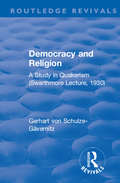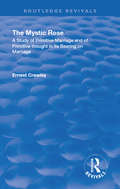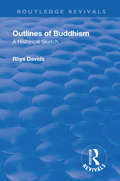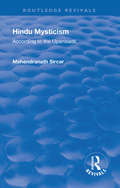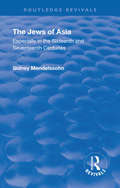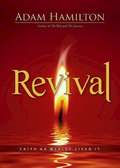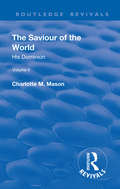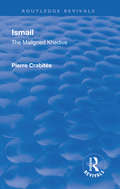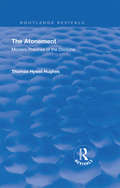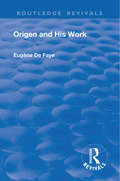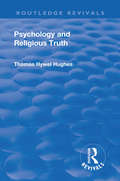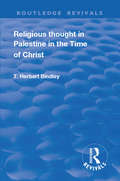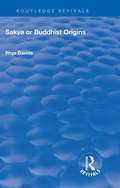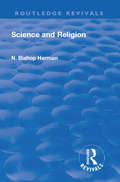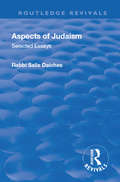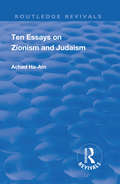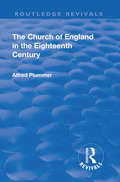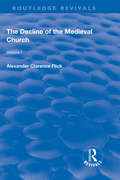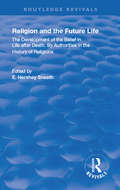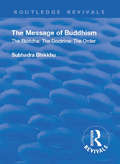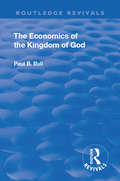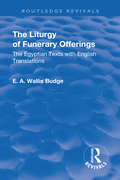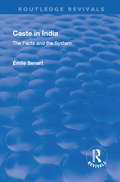- Table View
- List View
Revival: A Study in Quakerism (Swarthmore Lecture, 1930) (Routledge Revivals)
by Gerhart von Schulze-GävernitzThe Swarthmore Lectureship was established by the Woodbrooke Extension Committee, at a meeting held December 7th 1907: the minutes of the Committee provided for "an annual lecture on some subject relating to the message and work of the Society of Friends". The Lectureship has a two-fold purpose: first, to interpret further to the members of the Society of Friends their Message and Mission; and, secondly, to bring before the public the spirit, the aims and the fundamental principles of the Friends. The Lectures have been delivered on the evening preceding the assembly of the Friends’ Yearly Meeting in each year. The present Lecture was delivered at Friends House, London, on the evening preceding the Yearly Meeting, 1930.
Revival: A Study of Primative Marriage and of Primitive Thought in Its Bearing on Marriage (Routledge Revivals)
by Ernest CrawleyAll study of the origins of social institutions must be based on what ethnology can tell us of the psychology of the lower races and on the primitive conceptions of human relations which are thus established. It is only in early modes of thought that we can find the explanation of ceremonies and systems which originated in primitive society; and, if ceremony and system are the concrete forms in which human relations are expressed, an examination, ethnological and psychological, of human relations, is indispensable for enquiry into human institutions.
Revival: A historical sketch (Routledge Revivals)
by Rhys DavidsThis book discusses what is now called "Buddhism". It started as an effort to strengthen a weak point in that "immanence" which had become the accepted religious teaching in the valley of the Ganges, by showing that the "God/in/man" was realizable, not by gnosis and ritual, but in conduct. Conduct needed to be brought into relgion, into the relation between man and his eternal destiny. Man’s being is more truly becoming; and only in and by becoming a More, will he attain to an actual, not potential Most. In teaching a More worth in conduction, Buddhism brought in a teaching of the man himself as Less.
Revival: According to the Upanisads (Routledge Revivals)
by Mahendranath SircarHindu Mysticism provides an engaging introduction to the various mystical traditions that evolved over the centuries in India, including the sacrificial (Vedic), Upanishadic, Yogic, Buddhist, Classical Bhakti (Devotional) and Popular Bhakti. Given its sweeping scope, the text also serves as a useful overview to Indian thought for newcomers to this ancient philosophical and spiritual tradition.
Revival: An Indian Bible (Routledge Revivals)
by Ernest Thompson Seton Julia Moss SetonThere is no Native American Bible, just as there was no Pentateuch written by Moses, no Tripitika by Buddha, no Dialogues by Socrates, no Gospels written by Christ. The Native American teachings in the fields of art, handicraft, woodcraft, agriculture, social life, health, and joy, need no argument beyond presentation; they speak for themselves. This book, originally published in 1937, offers these teachings under the author's belief that the example and precept are what the world needs above any other ethical teaching, and in particular, the spiritual message, which is more important, but supposedly less understood.
Revival: Especially in the Sixteenth and Seventeenth Centuries (Routledge Revivals)
by Sidney MendelssohnThe present publication is the first that has attempted to portray the separate and progressive history of the Jews in the different countries which they have made their homes, since their expulsion from the land which they had been identified for something like thirty centuries. In these pages the author has endeavoured to compile a narrative of a great part of what has occurred to the Jews of Asia in the last eighteen and a half centuries.
Revival: Faith as Wesley Lived It (Revival)
by Adam HamiltonWesley’s message and his faith continue to speak to 21st-centuryChristians—calling for a revival of our hearts and souls so that ourworld might be changed.Join Adam Hamilton for a six-week journey as he travels to England,following the life of John Wesley and exploring his definingcharacteristics of a Wesleyan Christian. Wesley’s story is our story. Itdefines our faith and it challenges us to rediscover our spiritualpassion.This is a graciousgift that we will benefit from reading. The commentary is written by asuperb preacher who has a pastor’s heart and knows how to make the pastcome alive to strengthen our own experience. Prepare to be transformed.Richard P. Heitzenrater, William Kellon Quick Professor Emeritus of Church History and Wesley Studies at Duke Divinity SchoolAdam Hamilton connects John Wesley’s contribution in 18th-century England with his legacy for 21st-centuryAmerica, bringing lessons from Wesley’s life and ministry to bear ondiscipleship today. This is an excellent resource for personal anddenominational revival.Scott Jones, Resident Bishop of the Great Plains area of The United Methodist Church and author of The Wesleyan Way
Revival: His Dominion (Routledge Revivals)
by Charlotte M. MasonSOME OPINIONS OF THE PRESS ON "THE SAVIOUR OF THE WORLD" VOL. II. HIS DOMINIONThese reviews/comments followed the original release of His Dominion in 1908.Miss Charlotte Mason has now given us the second instalment of her elaborate work in verse on "The Saviour of the World." . . . Miss Mason renders into graceful and original verse part of the story of Christ as found in the Gospels. She seeks to cover each incident in His career, and each notable saying to which He gave utterance, in a single poem, the series to form a complete story. Her obvious sincerity and the high aim which is everywhere apparent make her pleasing verses singularly attractive. She is reverent throughout and always dignified.—Dundee AdvertiserMiss Mason has much of the subtle skill of Browning, and her effusions breathe everywhere a spirit of deep devotion to "The Saviour of Mankind."—Catholic TimesMiss Mason's gracefully versified tractate in Christian theology—for that is what the poem is—should be read without weariness by the devout . . . On its literary side the book will readily evoke the admiration and sympathy of readers who like to have familiar lessons of Christianity refreshed by good workmanship in metrical art.—ScotsmanThe first volume met with a very cordial reception, and now the talented authoress gives her second volume to the world. . . . The authoress employs the choicest language, and shows great skill in versification. The whole work, in fact, aims at giving the whole of the Gospel story in verse—not a small task, by any means, but one for which Miss Mason seems to be specially endowed.—Western MailMiss Mason here continues what she modestly describes as a "paraphrase in verse" of the Gospel story. As the writer aptly remarks, such a theme as this, in its sacred utterances and dramatic situations, finds a better medium of presentation in poetry than in prose. The first stage or act of the inspired narrative, The Holy Infancy, being completed, Miss Mason passes on to the Ministry of Our Lord at its commencement and first teaching (Sermon on the Mount and earlier parables), and first miracles . . . the sequence of the work is marked no less by the skill of the author than by the reverent spirit in which it is composed. Echoes of George Herbert and of Isaac Williams are to be caught here and there in the various pieces, as. E.g. where paraphrasing a passage in the Sermon on the Mount, Miss Mason writes: —"Nay, keep thy soul at eve,Nor e'er perceiveThe heavy odour of an unchaste thought."It would be difficult to express better the "atmosphere" of the new Paradise "regained" by Christ in place of that which was lost. —BooksellerThe same careful, reverent handling of holy things characterises this new volume, which, like the former, is a paraphrase, in blank verse chiefly, of the Gospel narrative.—Guardian
Revival: Ismail: The Maligned Khedive (Routledge Revivals)
by Pierre CrabitesThese pages challenge a historical heresy. They refuse to join in the chorus led by Milner, Colvin, and Cromer, and to agree that Ismail Pasha, the first Khedive of Egypt, was a spendthrift, a voluptuary, and a thief. Not even great names can stand up against facts and figures culled from official sources.
Revival: Modern Theories of Doctrine (Routledge Revivals)
by Thomas Hywel HughesThis volume can not be regarded as a history of the doctrine of Atonement, nor yet as a study of the Scriptural witness to it. It is rather an examination of the various theories and the more recent trends of thought with regard to it. An explanation is necessary with regard to two points in the study. Firstly, it is confined to Britain and the tendencies of thought in this country and secondly only those thinkers have been included who have exercised an appreciative influence in certain circles and whose contributions to the subject have carried weight in the sphere of theological thought.
Revival: Origen and his Work (Routledge Revivals)
by Eugene de FayeLast year (1925) the Olaus Petri Endowment greatly honoured the author by inviting him to deliver a few lectures on Origen at the University of Upsala. It was agreed that they should be published and we now offer them to the public exactly as they were delievered. There could be no question of expounding the entire thought of Origen in eight conferences. We have been compelled to pass over more than one important doctrine - for instance, his ideas on the Gnosis. Still less was it possible to set forth in these lectures the enormous mass of documents upon which our exposition of the theology of Origen is based.
Revival: Psychology And Religious Truth (1942) (Routledge Revivals)
by Thomas Hywel HughesAn attempt is made in this book to open a new line of thought in theology with the aid of Psychology. The author strives to throw light on the basic truths of religion from a new angle and to adopt a different attitude to that usually taken by theologians. He believes that there is still more light which psychology can throw regarding these truths, but its findings are not yet adequate nor sufficiently clear for this. Here the lectures cover the bearing of psychology on - The Origin of Religion; The Idea of God: Religious Life; Religious Truth and Belief; The Trinity; The Person of Christ; The Atonement; and The Future Life.
Revival: Religious Thought In Palestine In The Time Of Christ (1931) (Routledge Revivals)
by T.H. BindleyThis book is an attempt to bring together from many sources some of the more prominent features of the social, religious, and literary background of the New Testament – an endeavour to capture so far as is possible the atmosphere of thought and feeling in which our Lord and His contemporaries lived.
Revival: Richelieu (1928) (Routledge Revivals #No. 48)
by Karl FedernThe Purpose of this history of Cardinal Richelieu is to show the living personality of the man - to show it evolving, reacting to and acted on by other personalities - and to portray the conditions in France as he found them and transformed them. Within such a narrow compass it is not possible to give full particulars of the sources on which this biography is based. It is a remarkable fact that in French literature apart from works by the cardina;'s contemporaries, there is no biography of Richelieu, and the great work projected by Gabriel Hanotaux has been left uncompleted.
Revival: Sakya or Buddhist Origins (Routledge Revivals)
by Rhys Davids CarolineSakya or Buddhist Origins by Mrs. Rhys Davids is as relevant today as it was in 1928, the year of its first publication. Time has added to its value. The remarkable progress in the realm of Science has not abated man's yearning for the call of the quest. As the title implies, its aim is to unravel the genuine message of Gotama, the Buddha, from the accretions in the Pali scriptures, by adopting the techniques of archaeologist. It is divided into two parts. Part one treats of the discovery , the reconstruction, the rehabilitation of that which, at its birth, was a new and true word from very man to very man, true always and everywhere. Part two tells how this gospel came to be dressed to suit a monastic set of ideals. An appendix dealing with Pali Pitakas is added. Over the years, in spite of a large number of books, the horizons of knowledge about Buddhism have remained stationary. This book takes a further step in widening that knowledge and thus provides an impetus for further research.
Revival: Science and Religion (Routledge Revivals)
by N. Bishop HarmanA treatise on the co-existence of science and religion, the author of which is both a religious man and a doctor of medicine.
Revival: Selected Essays (Routledge Revivals)
by Rabbi Salis DaichesAddressed to Jews and non-Jews alike, though aware that these two reader groups were likelyn to approach the book with very different presuppositions, Daiches sets out to define Judaism in relation to philosophy, to explain Kant’s philosophy through the superiority of halakhah, defend a biblically based Jewish interpretation of history, and champion Judaism as a religion of freedom guaranteed by halakhah (Jewish law).
Revival: Ten Essays on Zionism and Judaism (Routledge Revivals)
by Achad Ha-amThe present voluime of translations from the Hebrew of Achad Ha-Am differs in character from the volume of Selected Essays published in 1912 by the Jewish Publication Society of America. The earlier selection was confined, by the express desire of the publishing Society, to essays dealing with the broader aspects of Judaism and Jewish thought; essays of a more polemical character, in which the author has defined his attitude to the modern Jewish national movement, were designedly omitted. Of the then further essays included in the present selection, only two belong to the former category, and these have been placed, out of their chronological order, at the end. The other eight essays all deal with one aspect or another of Zionism, and they form a series which will enable the English reader who is interested in the Zionist movement to follow its history under the guidance of one who is at the same time among its staunchest pillars and its most unsparing critics.
Revival: The Church of England in the Eighteenth Century (Routledge Revivals)
by Plummer AlfredIn a period of which so much is known, and of which the materials for additional knowledge are so abundant, as is the case with the eighteenth century, the writer of a handbook sees from the first that a very great deal, of even important matters, will have to be omitted: and one of his chief difficulties will be to decide which topics must be selected in order to give the reader an intelligible and coherent picture – faithful, as far as it goes – of the period as a whole.
Revival: The Decline of the Medieval Church Vol 1 (Routledge Revivals)
by Alexander Clarence FlickFirst Published in 2018. Routledge is an imprint of Taylor & Francis, an Informa company.
Revival: The Development of the Belief in Life After Death By Authorities in the History of Religions (Routledge Revivals)
by E. Hershey SneathThis book discusses the in-depth history regarding the development of the belief in the Life After Death, including incites from across history and culture. From Ancient Egyptian and Persian beliefs to modern Christianity and Islam.
Revival: The Doctrine; The Order (classic Reprint) (Routledge Revivals)
by Subhadra BhikkhuThe Message of Buddhism is an adaptation of the Buddhist Catechism of the late Subhadra Bhikkhu which was first published in 1888. The eighth and last edition of the Catechism was translated into English by C. T. Strauss, and was published by the Maha-Bodhi Society in 1908.
Revival: The Economics of the Kingdom of God (Routledge Revivals)
by Paul B. BullThe utterances of those entitled to speak for different groups of Christians on the industrial problem are scattered over many books, journals and pamphlets. The attempts of industrialists to show the way towards its solution, in Britain and the Dominions, and in the United States, have been many and various. What is offered here is a statement of the Christian ideal – The Kingdom of God, a collection of representative Christian utterances on what its realization today would mean, and a selection of attempts which are being made or suggested to move towards its realization in practice.
Revival: The Egyptian Texts with English Translations (Routledge Revivals)
by E. A. Wallis BudgeThis book has text and analysis of a key Egyptian ritual which was performed when preparing the corpse of a pharaoh for mummification. This is known as the "Book of the Opening of the Mouth". The ritual consisted of offering a long sequence of foodstuffs, beverages, cosmetics and other consumables, along with a litany recited by the priests. This text was also painted on the walls of the royal tomb. This recitation may be tedious and repetitous, but there is a reason that I've gone to the trouble of creating an etext of this book. Although Budge doesn't emphasize this, this text comprises an important part of the 'Pyramid Texts', of which only portions are available in public domain English translation.
Revival: The Facts and the System (Routledge Revivals)
by ÉMile Charles SenartThe aim of this book is to discover in what light the religious and literary tradition of India appears where caste is concerned; including discussions on the present system, the past, and its origins.
